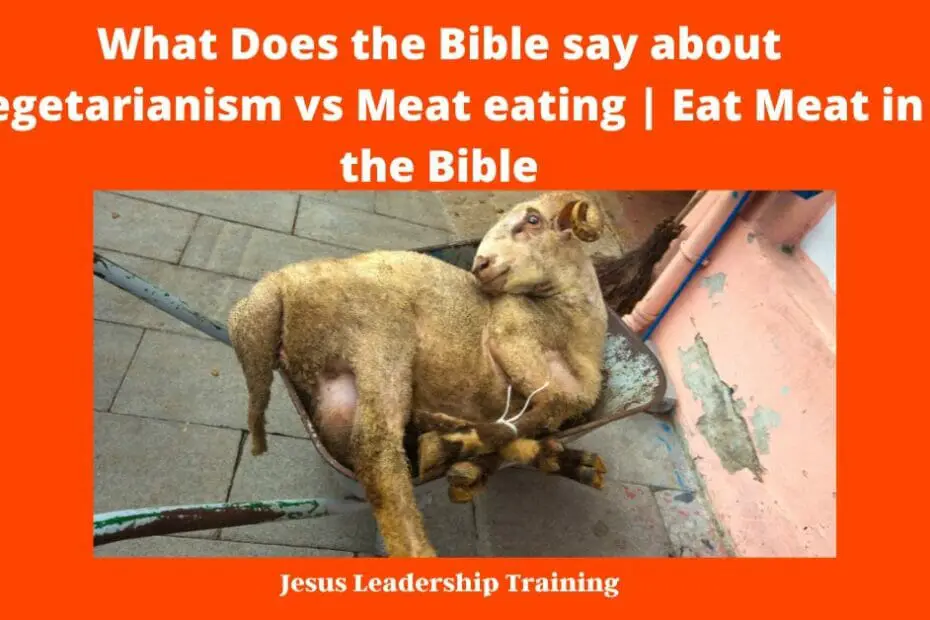Table of Contents
Is it Ok to Eat Meat in the Bible
For years, people have been debating whether or not it is okay to eat meat in the Bible. There are many different interpretations of what the scriptures say about this topic. In this blog post, we will explore what the Bible has to say about eating meat. We will also discuss how different religions interpret this passage and what it means for us today.
Why Did Men Eat Meat in the Bible
What did Men First Eat in Creation Recorded in the Bible?
The first thing that man ate in creation was plants. This is according to the Bible which records what happened in the garden of Eden. God had just created Adam and placed him in the garden. He then gave him the command not to eat from the tree of the knowledge of good and evil.
After creating Eve, Adam and she were allowed to eat from any other tree in the garden except that one. The next thing that is recorded as happening is that Satan came in the form of a serpent and tempted Eve into eating from the forbidden tree. She then gave some of the fruit to Adam who also ate it.
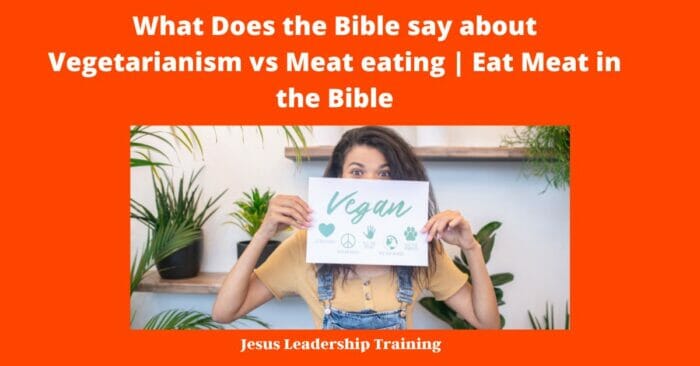
As a result, they both became sinful and were cast out of the garden. Although there are many different interpretations of this story, it is clear that the first thing that man ate was plants.
When did God first say Mankind Could Eat Meat?
When did God first give Mankind permission to eat meat? We need to go back to the very beginning, to the Garden of Eden. Here, God gave Adam and Eve plants and fruits to eat from every tree in the garden, except for one- the tree of the knowledge of good and evil.
After they sinned and were forced to leave the garden, things changed. In Genesis 9:3, God said to Noah and his sons, “Every moving thing (living creature) that lives shall be food for you. And as I gave you the green plants, I give you everything.” So, after the fall, God gave Mankind permission to eat meat. It’s important to note, however, that He also said in Genesis 1:29 that we are still to eat plants.
Therefore, we should not make meat the mainstay of our diets, but rather enjoy it as a part of a healthy diet that includes both plants and animals.
Does Old Testament say that Eating Meat is an Acceptable Practice?
Many people believe that the Old Testament contains harsh laws that prohibit the eating of meat. However, this is not the case. In fact, the Old Testament contains many verses that state that eating meat is an acceptable practice. For example, in Leviticus 11:2-3,
God gives Moses and Aaron a list of animals that are considered clean and unclean. Among the clean animals are cattle, sheep, goats, deer, and pigs. These are all animals that are commonly eaten by humans today. In addition, in Deuteronomy 14:4-5, God tells the Israelites that they are allowed to eat any animal that has split hooves and chews the cud. This includes cows, goats, deer, and sheep. Therefore, it is clear from these verses that the Old Testament does not prohibit the eating of meat. Animals were used for animal sacrifice.
Why is the Offering Meat Related to Sacrifice in the Bible?
In the Bible, there are many examples of people sacrificing animals to God. One example is when Abraham sacrificed a lamb to God (Genesis 22:13). Another example is when the Israelites were leaving Egypt, and they sacrificed lambs to God (Exodus 12:21). The offering of meat was also a part of worship in the tabernacle and the temple. So why is the offering of meat related to sacrifice in the Bible? There are a few reasons.
First, when an animal is sacrificed, it is an act of obedience to God. Second, the animal is a symbol of something that is valuable to the person offering the sacrifice. For example, when Abraham sacrificed a lamb, it was a symbol of his willingness to obey God, even if it meant giving up something that was very important to him.
Third, the act of sacrifice demonstrates our trust in God. When we offer something to God, we are saying that we believe He is worthy of our best. fourth, sacrifice is an act of worship. When we give our best to God, we are acknowledging Him as Lord and King. These are just a few of the reasons why sacrifice is such an important part of worship in the Bible.
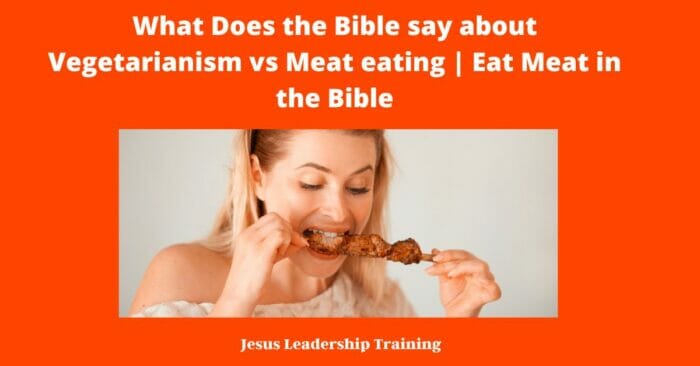
Does theNew Testament say that eating meat is an acceptable practice, but with some restrictions?
The New Testament is actually pretty silent on the issue of eating meat. In the early days of the Church, there were Christians who believed that all meat was unclean and should be avoided. However, there were also Christians who believed that eating meat was perfectly acceptable. As a result, there was some debate on the topic.
Ultimately, however, the New Testament doesn’t take a hard line one way or the other. Instead, it simply states that each person should make their own decision on the matter. “If you eat, do so to the Lord’s glory,” Paul wrote in 1 Corinthians 10:31. In other words, whether or not you eat meat is up to you. Just make sure that your decision is based on what will bring glory to God, not what will satisfy your own appetites.
We do not want to cause brother stumbles for the sake of food. Each of us is accountable to our own master lord Jesus,We do not want to hamper the work of God over animal flesh.
Why is Eating meat considered a stumbling block for some people?
There are a few reasons why this is a stumbling block for some people. First, they may believe that eating meat is cruel to animals. Second, they may believe that consuming meat is unhealthy for humans. Third, they may believe that producing meat requires too much land and resources and that eating vegetables is a more sustainable way of life.
Whatever the reason, it is important to remember that God has given us permission to eat meat and that there is no law requiring us to be vegetarians. Ultimately, whether or not we eat meat is a matter of personal conscience. In Biblical Days animals sacrificed to idols were a large source of food for the meat market.
Does The Kingdom of God include the consumption of meat as one of its aspects?
The Kingdom of God includes the consumption of meat as one of its aspects. Meat provides many benefits for our physical bodies, including protein, vitamins, and minerals. It also helps us to feel satiated and provides us with energy. However, there are also some drawbacks to meat consumption.
Meat is high in saturated fat and cholesterol, which can lead to health problems such as heart disease and obesity. In addition, the livestock industry is a major contributor to greenhouse gas emissions, which are a leading cause of climate change. Despite these drawbacks, there are many reasons to believe that the consumption of meat is an important part of the Kingdom of God. First and foremost, God Himself ordained that we should eat meat (Genesis 9:3).
Additionally, the Bible contains numerous examples of God’s people eating meat (Leviticus 11:2-47; 1 Samuel 2:15). Finally, Jesus Himself ate meat (Luke 24:41-43), and He even provided meat for others on multiple occasions (John 21:9-13). For all these reasons, it is clear that the consumption of meat is an important part of the Kingdom of God.
List of 10 Events in Jesus’ Life that he Participated in Eating Meat
One of the most often repeated questions we get asked is: “Did Jesus eat meat?” To answer that question, we need to look at what the Bible says about Jesus’ diet. Here are 10 events in Jesus’ life where he is recorded as eating meat:
1. The Last Supper – Matthew 26:26-29; Mark 14:22-25; Luke 22:17-20; John 13:21-30
2. The Feeding of the 5000 – Matthew 14:13-21; Mark 6:31-44; Luke 9:12-17; John 6:1-15
3. The Feeding of the 40000 – Matthew 15:32-39; Mark 8:1-9
4. Jesus Turns Water into Wine – John 2:1-11
5. Zacchaeus climbs a tree to see Jesus – Luke 19:1-10
6. The healing of the paralytic at Bethesda – John 5:1-9
7. The healing of Jairus’ daughter – Matthew 9:18-26; Mark 5:21-43; Luke 8:40-56
8. The healing of the blind man – John 9:1-7
9. The raising of Lazarus from the dead – John 11:1-44
10. The ascension into heaven – Acts 1:6-11
Why Did Jesus Christ say that we should not be our own masters when it comes to what we eat?
When it comes to what we eat, Jesus Christ said that we should not be our own masters. In the book of Mark, Jesus was asked by the Pharisees when the kingdom of God would come. Jesus replied, “The kingdom of God does not come with observation; nor will they say, ‘See here!’ or ‘See there!’ For indeed, the kingdom of God is within you.”
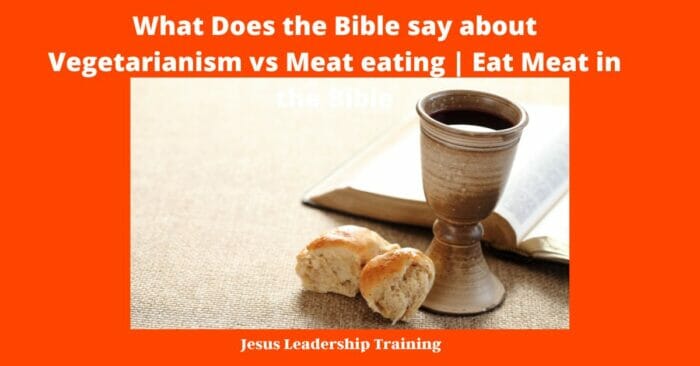
Then he said to them, “Whatever you eat or drink, or whatever you do, do all to the glory of God.” In other words, we are not to be controlled by what we eat or drink. We are to do all things, including eating and drinking, for the glory of God. This means that we are to be mindful of how our food choices reflect our love for God and our neighbor. When we are obedient to this commandment, we glorify God in all that we do.
List of What Meats are part of the unclean foods category?
In the book of Leviticus, God lists several animals that are considered “unclean” and are therefore not to be eaten by His people. These animals include pigs, camels, rabbits, shellfish, and many others. However, there is some debate among scholars as to whether all of these animals are actually included in the unclean foods category.
For example, some believe that pigs are only included because they were commonly used for sacrificial purposes in the ancient world. Others believe that shellfish are only included because they were considered to be “ scavengers” of the sea and were therefore seen as unclean. Ultimately, it is up to each individual to decide which interpretation they believe is correct.
List of What Meats are part of the clean foods category?
There are many opinions out there about which meats are clean and which are not. However, the Bible is very clear on this topic. Leviticus 11:1-47 lists all of the animals that are considered clean and unclean. These include both land animals and fish. Some of the clean animals include cattle, sheep, goats, deer, and quail.
The unclean animals include pigs, rabbits, camels, bats, and rats. It is important to note that these regulations were not given as a matter of health or nutrition. Rather, they were given as a way to set the Israelites apart from other nations. By following these laws, the Israelites demonstrated their obedience to God and their commitment to holiness.
The Bible speaks about how meat should be handled and prepared before it is eaten.
According to the Bible, there are certain guidelines that should be followed when it comes to handling and preparing meat. In Leviticus 11:3-8, God lays out specific instructions for which animals are clean and which are unclean. Those that are considered clean can be eaten, but they must be properly prepared.
The first step is to slaughter the animal in a way that causes as little pain as possible. Next, the animal should be washed with water to remove any blood. Finally, the meat should be cooked over a fire so that all of the impurities are burned away. These guidelines may seem like a lot of work, but they are designed to ensure that we are eating only the highest quality meat. By following these rules, we can be sure that we are eating food that is both delicious and nutritious.
Why When someone stumbles upon eating meat, it can become a stumbling block for them.
Many people discovered the benefits of eating a plant-based diet and have never looked back. They feel healthier, their energy levels are higher, they require less sleep, and they rarely get sick. However, there are some people who find themselves struggling after they make the switch to a vegan diet. They may feel weaker, their skin may break out, and they may even experience digestive issues. For some people, these problems can be so severe that they feel like they have no choice but to go back to eating meat.
There are a few possible explanations for why this happens. It could be that the person was not getting enough of certain nutrients on a plant-based diet. Or it could be that the person was not used to eating such a large quantity of plants and their digestive system was not able to adjust. Whatever the reason, it is important to remember that these problems are only temporary. With time and patience, most people are able to overcome them and enjoy all the benefits of a vegan diet.
Why Do Catholics Choose Not to Eat Meat on Fridays?
Catholics are not the only Christians who abstain from meat on Fridays. Many other Christians do as well, including some Protestant denominations and Orthodox Christians. The practice of fasting from meat on Fridays can be traced back to the early Church. In the Bible,
Jesus says that when we give up something for the sake of God, it will be repaid to us in heaven (Matthew 6:17-18). For Catholics, abstinence from meat is a form of fasting. It is a way of denying ourselves something that we enjoy for the sake of drawing closer to God. In addition, abstinence from meat is a reminder of Jesus’ self-denial. By giving up meat on Fridays, we identify with Jesus’ sacrifice and show our willingness to deny ourselves for the sake of others.
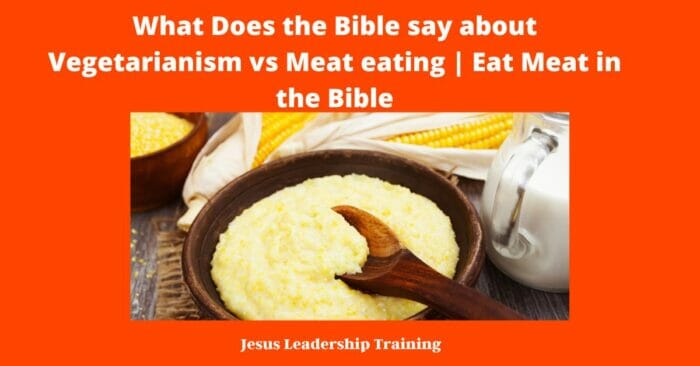
Is it a Sin To Eat Meat?
Many people believe that it is a sin to eat meat because God gave us plants to eat. However, when we look at what the Bible says, we see that God actually gave us both plants and animals to eat. In Genesis 1:29-30, God says, “Behold, I have given you every plant yielding seed that is on the face of all the earth, and every tree with seed in its fruit. You shall have them for food.
And to every beast of the earth and to every bird of the heavens and to everything that creeps on the earth, everything that has the breath of life, I have given every green plant for food.” So from the very beginning, God intended for us to eat both plants and animals.
There are also many passages in the New Testament where Jesus and his disciples are eating meat (e.g., Luke 24:42-43). If eating meat were a sin, surely Jesus would have made that clear. Instead, he ate meat himself and never condemned others for doing so. Therefore, we can conclude that it is not a sin to eat meat.
Is it a Sin Not To Eat Meat?
As a society, we have become increasingly disconnected from the sources of our food. It is easy to forget that meat does not come from the grocery store, but from living, breathing animals. This disconnection can lead us to view animals as commodities rather than living creatures and to see their flesh as nothing more than a source of protein. However, the Bible teaches us that God created all creatures and that we are to care for them with compassion and respect.
What Religions today refrain from eating meat for Spiritual Reasons
Religion has always been a big part of humanity. It is what helps to define us and our beliefs. There are many different religions practiced around the world, and each has its own unique set of beliefs and practices. One common practice among many religions is the avoidance of eating meat for spiritual reasons. This practice is based on the belief that all life is sacred and should be respected. For this reason, many followers of
Buddhism,
Hinduism,
Jainism, and
Sikhism refrains from eating meat.
These religions typically promote vegetarianism or veganism as a way to live in harmony with all living beings. While there are many reasons why people choose not to eat meat, spiritual reasons are some of the most common. In the United States today God’s Instructions is that we generally do not pass judgment on those that choose a vegetarian diet. In the Eyes of God, the dietary laws of green herbs,seed-bearing plants, and fruit of a tree are a matter of eating and their own personal Faith.
Final Thoughts – What does the Bible say about eating Meat
Many Christians churches today refrain from eating meat for spiritual reasons.
- The New Testament teaches that eating certain foods sacrificed to idols is wrong (1 Corinthians 8:1-13; 10:14-33).
- Also, the New Testament teaches that it is better not to eat meat or drink wine if it will cause someone else to stumble (Romans 14:21; 1 Corinthians 8:13).
- Some Christians believe that since the New Covenant did away with the old ceremonial laws regarding food, they are now free to eat anything they want (Mark 7:19; Acts 10:9-16; 11:4-10; 15:1-29; 1 Timothy 4:1-5).
- Other Christians believe that since Jesus is the fulfillment of the Old Testament law, they should no longer follow any of the Old Testament food laws (Matthew 5:17-20).
- Some Christians believe that all food is clean and that there are no longer any food laws that need to be followed (Mark 7:14-23; Acts 10:15; 11:1-10).
- Whatever view a Christian takes on this matter, the important thing is to be respectful of those who hold a different view than you do (Romans 14:1-12; 15:1-7; 1 Corinthians 8-10; Philippians 2:3-
God Bless Greg


